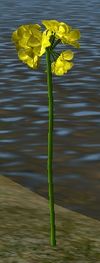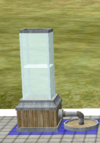The Wiki for Tale 8 is in read-only mode and is available for archival and reference purposes only. Please visit the current Tale 11 Wiki in the meantime.
If you have any issues with this Wiki, please post in #wiki-editing on Discord or contact Brad in-game.
Difference between revisions of "Papyrus"
(Created page) |
m |
||
| Line 11: | Line 11: | ||
It can also be turned into [[Papyrus Paper]] or [[Dried Papyrus]] and used for multiple items. | It can also be turned into [[Papyrus Paper]] or [[Dried Papyrus]] and used for multiple items. | ||
| + | |||
| + | |||
| + | ==Wild Cultivation== | ||
| + | In the wild, papyrus is grown by throwing seeds into the Nile, then waiting for them to float downstream (i.e. northward), where they wash up on the riverbank and grow into papyrus plants. | ||
| + | Plant seeds on a muddy bank, then look for plants about 10 minutes later about 100-150 coordinates NORTH and on both banks from where you planted it. (This means you should usually plant within 100 coordinates of a bridge.) Both the West Nile and East Nile are valid planting areas. | ||
| + | Also note that in some locations it will appear as though there is a "dead spot" where the Papyrus does not grow. This is not the case and is caused by nearby ponds and lakes generally to the east of the section of the nile you were planting in. If you find that there is a large gap, check for lakes and ponds nearby. I have seen papyrus travel as far as 300 (in t6) coordinates inland and sometimes even further. Plants may even travel from Eastern Nile to Western Nile or vice verca, if the distance is short enough between the two streams of water (typically near a river fork). | ||
==Research and Tuition== | ==Research and Tuition== | ||
Revision as of 00:49, 16 May 2018
| English | français |
Papyrus comes in two varieties, depending on how it is grown:
- Fertile Papyrus is cultivated by sowing Papyrus Seeds (hf) along the Nile. It also yields new seeds when dried.
- Sterile Papyrus is obtained by growing Papyrus Seeds (hf) in a Papyrus Tank. It is identical to fertile papyrus except that it does does not give seeds when dried.
Wild papyrus plants were around at the start of the telling, but at this point, any papyrus you come across will have been cultivated by somebody. Taking papyrus that you didn't seed yourself is considered by some to be rude.
It can also be turned into Papyrus Paper or Dried Papyrus and used for multiple items.
Wild Cultivation
In the wild, papyrus is grown by throwing seeds into the Nile, then waiting for them to float downstream (i.e. northward), where they wash up on the riverbank and grow into papyrus plants. Plant seeds on a muddy bank, then look for plants about 10 minutes later about 100-150 coordinates NORTH and on both banks from where you planted it. (This means you should usually plant within 100 coordinates of a bridge.) Both the West Nile and East Nile are valid planting areas. Also note that in some locations it will appear as though there is a "dead spot" where the Papyrus does not grow. This is not the case and is caused by nearby ponds and lakes generally to the east of the section of the nile you were planting in. If you find that there is a large gap, check for lakes and ponds nearby. I have seen papyrus travel as far as 300 (in t6) coordinates inland and sometimes even further. Plants may even travel from Eastern Nile to Western Nile or vice verca, if the distance is short enough between the two streams of water (typically near a river fork).
Research and Tuition
- 4000 required for Papyrus Paper Fabrication research


